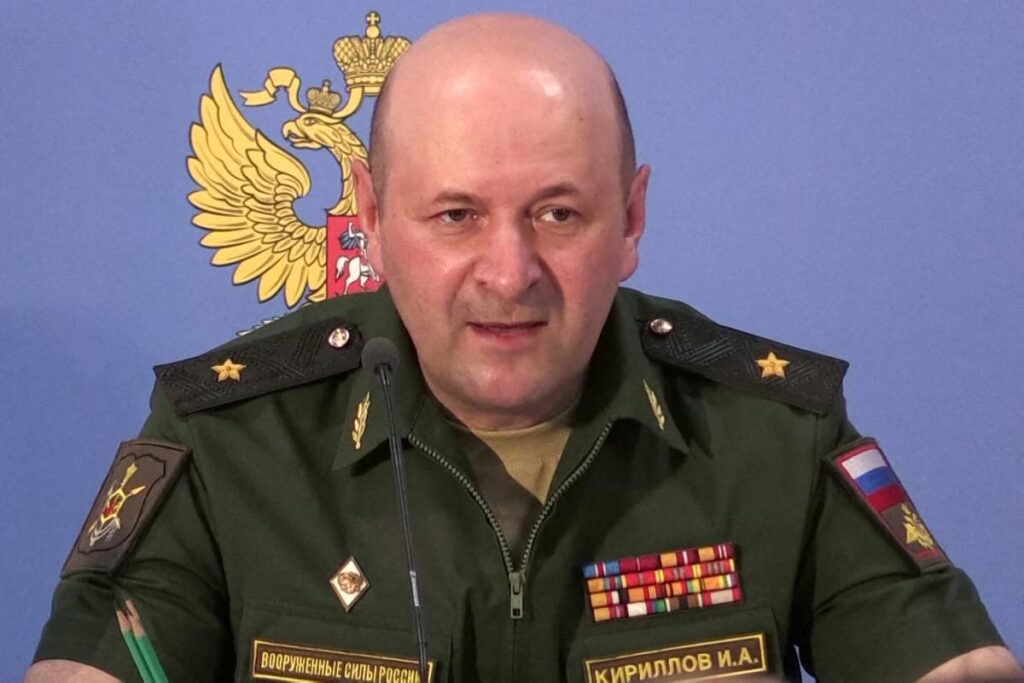A significant event unfolded in Moscow with the assassination of Lt. General Igor Kirillov, head of Russia’s nuclear, biological, and chemical defense forces, accused of using banned chemical weapons during the ongoing conflict in Ukraine. Early Tuesday morning, Kirillov and his assistant were killed by a remote-controlled bomb concealed in an electric scooter, detonated outside an apartment building in the Ryazansky Prospekt neighborhood. Russian authorities, specifically the Investigative Committee responsible for serious crimes, confirmed the deaths, stating that the scene was marked by violence, with blood-stained snow and destruction at the building’s entrance. Initially regarded as a homicide investigation, police sources indicated that the case might shift towards categorization as a terrorism incident.
Ukrainian sources reportedly claimed responsibility for the operation, suggesting it was conducted by the Security Service of Ukraine (SBU). They referred to Kirillov as a “war criminal” and emphasized that his assassination was justified due to his alleged directives concerning the use of banned chemical weapons against Ukrainian military forces. The SBU highlighted the severity of Kirillov’s actions, stating that ramifications are inevitable for those who perpetrate war crimes. This assertion underscores the broader theme of retribution that permeates the ongoing crisis, as both sides contend with the impacts of warfare and seek accountability for actions taken during the conflict.
The diplomatic and geopolitical stakes involved in Kirillov’s assassination are further underscored by the backdrop of allegations relating to the use of prohibited chemical agents. Notably, just a day prior to his death, the SBU charged Kirillov in absentia for his involvement in deploying illegal chemical weapons, including specific types of combat grenades against Ukrainian forces since the conflict escalated in February 2022. According to SBU reports, these chemical weapons have reportedly been utilized over 4,800 times on the battlefield, resulting in severe health consequences for Ukrainian soldiers, including hospitalizations and fatalities due to chemical poisoning. Russia has vehemently denied the use of such weapons, countering with accusations against Ukraine regarding safety protocol violations related to nuclear oversight.
International actors have also weighed in on the situation, with the U.S. Department of State confirming reports of chemical agents’ deployment against Ukrainian forces, highlighting chloropicrin—a toxic choking agent first used during World War I—as one such weapon. Additionally, the United Kingdom and Canada have taken punitive measures against Kirillov, placing sanctions on him due to his role in employing chemical weapons throughout the conflict. These international responses not only illustrate the growing concern for humanitarian standards during warfare but also signify the potential for broader repercussions against Russian officials and military leaders implicated in such actions.
The assassination of Kirillov mirrors a pattern of high-profile killings within Russian territory since the onset of the Ukraine invasion, indicating a fraught atmosphere of retaliation and targeted strikes. Just days prior to Kirillov’s demise, Ukrainian forces eliminated a prominent missile developer working under Russian President Vladimir Putin. Historical precedents include the assassination of Darya Dugina, the daughter of nationalist figure Alexander Dugin, and the targeted killings of other individuals linked to the war effort, further highlighting a trend of violent retribution affecting various levels of personnel involved in the conflict on both sides.
Ultimately, the killing of Lt. General Igor Kirillov opens new avenues of narrative surrounding the Ukraine conflict, focusing on themes of accountability and the consequences of warfare. As investigations continue, the implications of this assassination will likely ripple through military and political spheres, influencing not only current tactics employed but also shifting perceptions within the international community regarding the ongoing conflict. As the war unfolds, the intertwining actions of state-sponsored violence and personal vendettas will continue to shape the overarching discourse of this enduring crisis.

